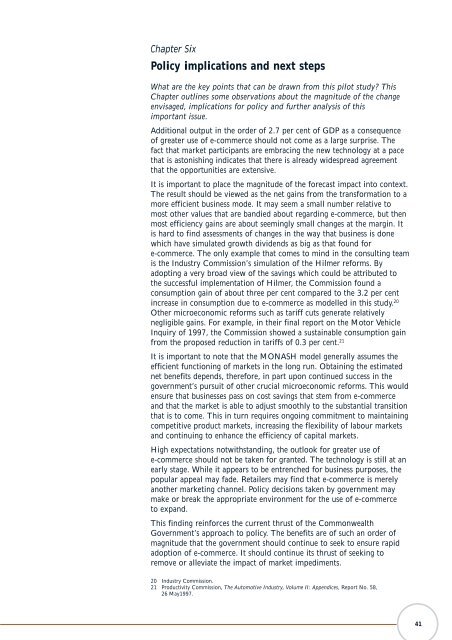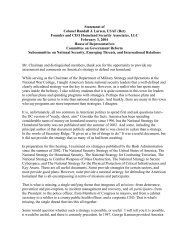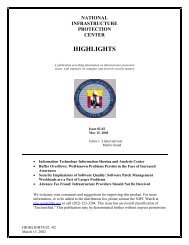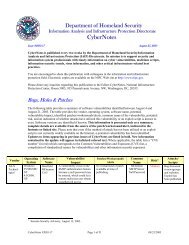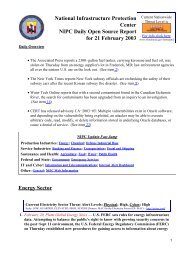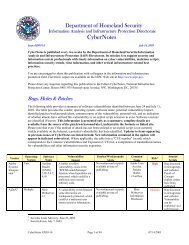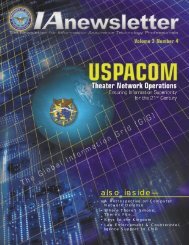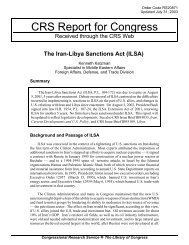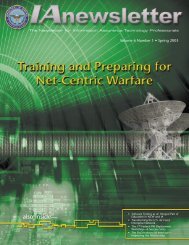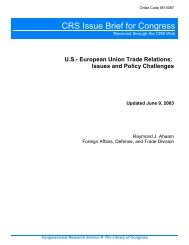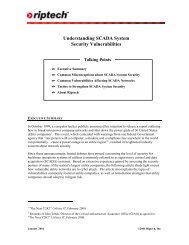beyond pt 0 23/1
beyond pt 0 23/1
beyond pt 0 23/1
You also want an ePaper? Increase the reach of your titles
YUMPU automatically turns print PDFs into web optimized ePapers that Google loves.
Cha<strong>pt</strong>er Six<br />
Policy implications and next steps<br />
What are the key points that can be drawn from this pilot study? This<br />
Cha<strong>pt</strong>er outlines some observations about the magnitude of the change<br />
envisaged, implications for policy and further analysis of this<br />
important issue.<br />
Additional output in the order of 2.7 per cent of GDP as a consequence<br />
of greater use of e-commerce should not come as a large surprise. The<br />
fact that market participants are embracing the new technology at a pace<br />
that is astonishing indicates that there is already widespread agreement<br />
that the opportunities are extensive.<br />
It is important to place the magnitude of the forecast impact into context.<br />
The result should be viewed as the net gains from the transformation to a<br />
more efficient business mode. It may seem a small number relative to<br />
most other values that are bandied about regarding e-commerce, but then<br />
most efficiency gains are about seemingly small changes at the margin. It<br />
is hard to find assessments of changes in the way that business is done<br />
which have simulated growth dividends as big as that found for<br />
e-commerce. The only example that comes to mind in the consulting team<br />
is the Industry Commission’s simulation of the Hilmer reforms. By<br />
ado<strong>pt</strong>ing a very broad view of the savings which could be attributed to<br />
the successful implementation of Hilmer, the Commission found a<br />
consum<strong>pt</strong>ion gain of about three per cent compared to the 3.2 per cent<br />
increase in consum<strong>pt</strong>ion due to e-commerce as modelled in this study. 20<br />
Other microeconomic reforms such as tariff cuts generate relatively<br />
negligible gains. For example, in their final report on the Motor Vehicle<br />
Inquiry of 1997, the Commission showed a sustainable consum<strong>pt</strong>ion gain<br />
from the proposed reduction in tariffs of 0.3 per cent. 21<br />
It is important to note that the MONASH model generally assumes the<br />
efficient functioning of markets in the long run. Obtaining the estimated<br />
net benefits depends, therefore, in part upon continued success in the<br />
government’s pursuit of other crucial microeconomic reforms. This would<br />
ensure that businesses pass on cost savings that stem from e-commerce<br />
and that the market is able to adjust smoothly to the substantial transition<br />
that is to come. This in turn requires ongoing commitment to maintaining<br />
competitive product markets, increasing the flexibility of labour markets<br />
and continuing to enhance the efficiency of capital markets.<br />
High expectations notwithstanding, the outlook for greater use of<br />
e-commerce should not be taken for granted. The technology is still at an<br />
early stage. While it appears to be entrenched for business purposes, the<br />
popular appeal may fade. Retailers may find that e-commerce is merely<br />
another marketing channel. Policy decisions taken by government may<br />
make or break the appropriate environment for the use of e-commerce<br />
to expand.<br />
This finding reinforces the current thrust of the Commonwealth<br />
Government’s approach to policy. The benefits are of such an order of<br />
magnitude that the government should continue to seek to ensure rapid<br />
ado<strong>pt</strong>ion of e-commerce. It should continue its thrust of seeking to<br />
remove or alleviate the impact of market impediments.<br />
20 Industry Commission.<br />
21 Productivity Commission, The Automotive Industry, Volume II: Appendices, Report No. 58,<br />
26 May1997.<br />
41


